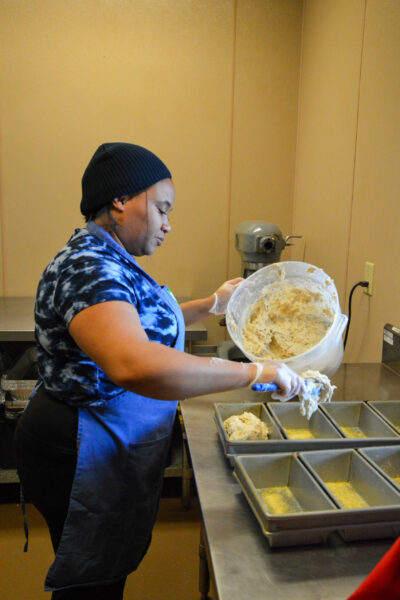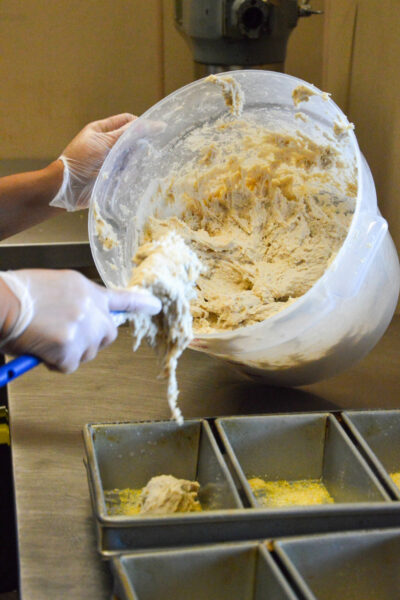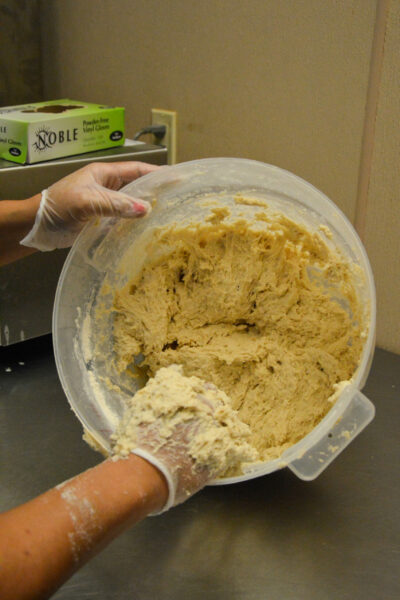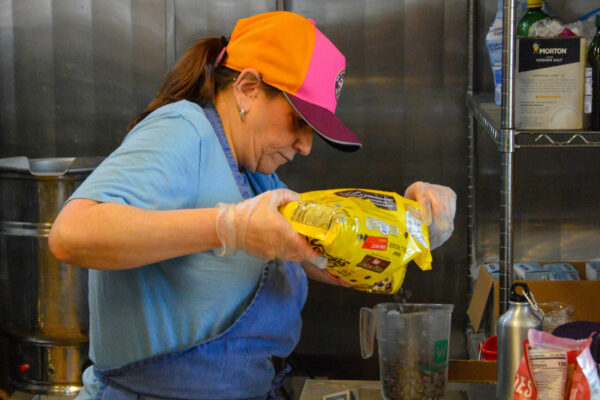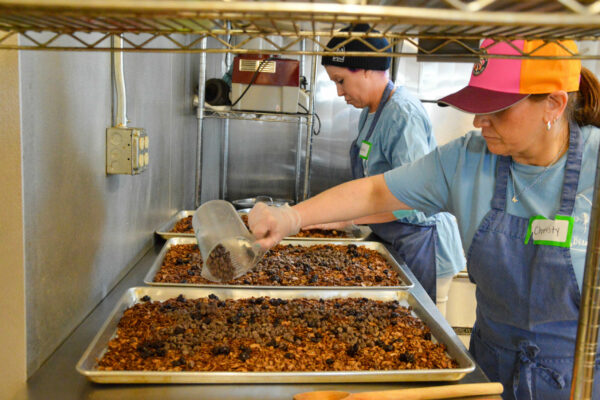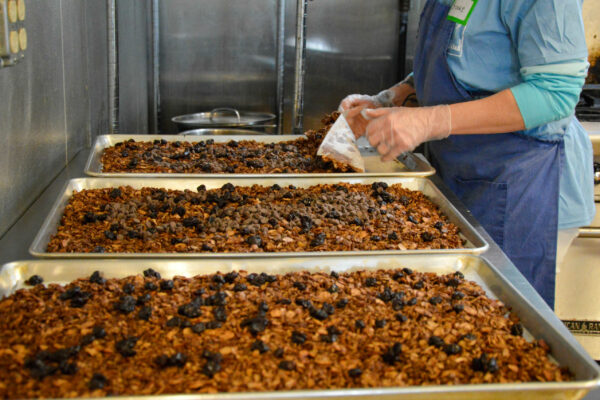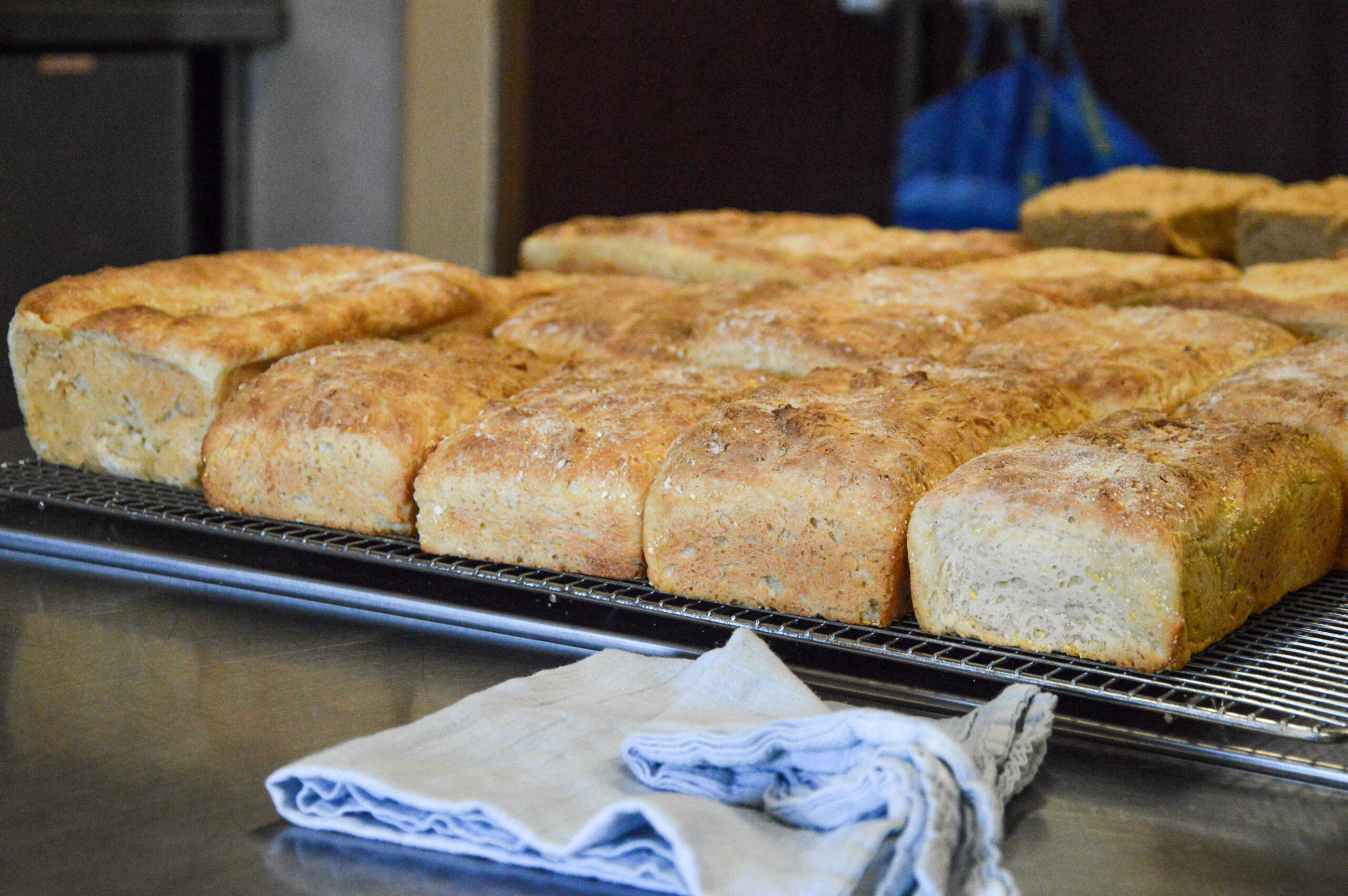
A Roanoke non-profit helps women gain new skills and build bonds
WORDS & PHOTOS| Lisa Archer
“I don’t have a lot of negative memories about the kitchen, you know? It’s the happy spot. The kitchen is where the heart is.”
On a spring-like February morning I step into the LEAP community kitchen in Roanoke and am met with a flurry and flour cloud of activity. If the smell of toasted oats, almonds and cinnamon hadn’t signaled I was in the right place, the steady patter of voices and thwunks of bread being turned out of tins onto counters clues me in.
I’ve come to observe the first bake day of the new House of Bread cohort. House of Bread is a faith-based non-profit designed to help formerly incarcerated women gain new skills and re-enter the workforce. Now in its sixth year, the ten-week program is held every spring and fall. In addition to learning baking and kitchen skills, participants meet weekly to develop life skills such as resume writing, prepping for job interviews and reacclimating to civilian life.
Why baking? It’s easy to establish a common environment when you’re elbow-deep in bread dough, kneading shoulder-to-shoulder. Co-founded by Jen Brothers, Jordan Hertz and Lisa Goad, House of Bread (HoB) drew inspiration from a similar non-profit in Alexandria, Together We Bake. Goad is the current program coordinator. In addition to the multitude of roles she fulfills at HoB, she’s also an avid baker and develops all of the recipes participants prepare.
The program begins with a two-week ServSafe training class — a food and beverage safety training and certificate program that is required by many food service jobs. After the ServSafe training, the program moves into the baking and mentoring portions. Bake-offs happen every other week. The products made are sold to the public and the proceeds go towards purchasing ingredients, paying for the community kitchen space and other program expenses.
Goad has created recipes that cover a variety of baking basics. Participants learn how to scale recipes, weigh ingredients, use a large-format mixer, bake and package as they make granola, cookies, scones and breads. Occasionally they’ll get to work with a fun local ingredient, such as when Goad’s neighbor donated her fig harvest last fall.
Though the program is small — only four to eight participants at a time — Goad notes that this allows them to focus on the individual; they can tailor the program to match the needs of the students. The students face many roadblocks as they prepare to re-enter the job market, perhaps the largest one being the stigma that having a record holds. Goad quotes one of the program’s early participants: “I need people like you to not be afraid to be seen with people like me.” In the kitchen, cultural, financial and spiritual differences aren’t at the forefront. Women bond over the sensation of tacky bread dough sticking in the webs of their hands. They laugh as they fold chocolate chips and dried cherries into still-warm granola, chocolate melting onto food-safe gloves and fingerprinting parchment paper.
“They just need community,” says Goad.
Between 2010-2014 the incarceration rate of women in Virginia increased by 32%, according to a study conducted by the Virginia ACLU. Women who are incarcerated tend to be young, plagued by poverty and lacking in job skills. Most who are parents are the sole or primary caregiver of their children prior to their incarceration. Often, what leads someone to be engaged with the criminal system is an attempt to cope with challenging aspects of their lives.
Like many nonprofits, HoB relies on charitable donations from organizations such as local churches, businesses and individuals. Reacclimation after incarceration can be difficult, which is why programs such as House of Bread are so vital. During the weeks that students don’t bake, HoB leads classes and workshops to prepare them for jobs and also provides spiritual and emotional support in the form of yoga classes, discussion groups or Bible study. The students are also paired with mentors, who meet with them for an hour each week. Mentors help students see their own potential, establishing goals and developing a blueprint of how to build towards each of those goals.
Brooke, whose happy place is in the kitchen (opening quote), is currently in a twelve-step program. She and another participant, Christie, live at the same halfway house and Brooke has taken on the role of cooking meals for residents. “It’s gotten a lot better since she took over meal prep,” says Christie. “I raised my three nephews and my own kids; I like to take care of people,” says Brooke. “I taught them all how to cook. I’d put on music and we’d have a dance party in the kitchen.” Brooke dreams of one day having her own cafe. “Tea and coffee, jazzy vibes. Cool but unpretentious … I even know how to make crumpets!” she tells me as she mixes a sheet tray of granola.
On the day of my kitchen visit, Goad teaches a lesson in problem-solving as they discover that a batch of their English muffin bread has had the wrong flour added to it, along with too much liquid. This makes the dough heavier than normal and it struggles to rise in the oven. With the pick-up time for customers rapidly approaching, two volunteers, Goad and a student work quickly to bake off another batch. As Sarah pulls the dough together with her hands, she tells me she has three children at home and enjoys baking with them. She saw the program as an opportunity, both for help finding a job and also because it may help her find something she actually enjoys doing for a living. “I like to bake with my kids,” she says as she drops dough into bread tins.
Although not all are experienced, many women in the room share a love for baking. That’s why Susan started volunteering six years ago. “I love to bake; I’m always baking. I knew Lisa from our church and I knew if she were involved, it was going to be a program that made a difference. Here, barriers are dropped.”
It’s true, too. When I entered the kitchen I spotted eleven women in HoB shirts and varying fades of jeans. I didn’t know who was a student and who was a volunteer. Instead, I saw women laughing and chatting as they scooped cookie dough, washed dishes and watched timers.
Goad points out that the greatest impact the program can have is to make its participants feel seen and heard, and not in a context of past offenses or mistakes.
The program ends with students and mentors holding a mock job interview, followed by a graduation ceremony. After graduation, it’s up to the students if they’d like to stay in contact. Some students stay in touch, either with their mentors or with Goad and the program. A few graduates have even come back to volunteer in turn.
As important as the program is for the students, it may be just as beneficial to the mentors and volunteers. “I did not have any close relationship with anyone in jail or the prison system,” says Goad. “I have benefited tremendously from this work, from these relationships. I believe when we remove some of the barriers these women face, we are changing Roanoke for the better.”
Most of us want to feel seen and have our voices heard. To be acknowledged for who we are as a whole. To be seen as a person and not a label. House of Bread does just that.
Want to become involved with House of Bread?
houseofbread.com


